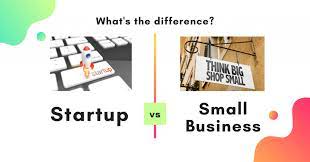Startup vs Small Business. Are they the same? The short answer is – no. To be a Startup, the Founder has to commit to, and the business model has to enable, a rapid scaling/growth model that ideally culminates in at least a US 1 Billion company valuation followed by an initial public offering (IPO).
Three Differences – Startup vs Small Business
Which Is Right For You?
Startups have been given an almost mythological status thanks to wild success stories, cults of personality, and the entertainment industry. They look exciting – but they’re also filled with risk, and they work better for some types of products and services than others.
Don’t make the mistake of thinking that startups are the only way to get rich. You can still grow a small business into a well-oiled machine that makes money for you while you’re not there. Every restaurant franchise, global law firm, and regional car dealership chain started out as a small business.
Deciding between a startup vs small business has less to do with making money and more to do with the industry you’re in, as well as your own personality, leadership style, and risk tolerance.

Takeaway
Many people who are not familiar with the Startup industry mistakenly call all businesses that get founded a “startup”. The reality is that Startups have nothing in common with small businesses, apart from the obvious, which is that both of them “start-up” at some point, before then pursuing entirely different business models.
About The Author
James Spurway is an Angel Investor, Mentor, Advisor, Speaker, former Commercial Pilot, and Author who specialises in raising debt and equity capital. He strives to model diversity, equity, and inclusion in the founders he agrees to invest and work with. He has paused his angel investing activity to focus on raising his first US$ 50M venture capital fund, which will invest in startups that can accelerate the achievement of net zero emissions. James spent the past 33 years living in Hong Kong, Vietnam, Germany, Switzerland, Monaco, the USA, Thailand, the Philippines, Singapore, and Australia, his country of birth. In that time, he started 10 businesses, exited from seven, shut down two, and kept one. He has invested in a total of 50 startups since 2001 and had six successful exits.


